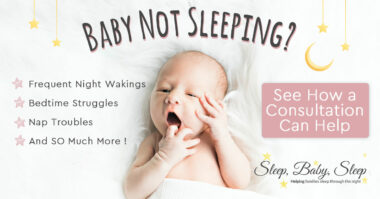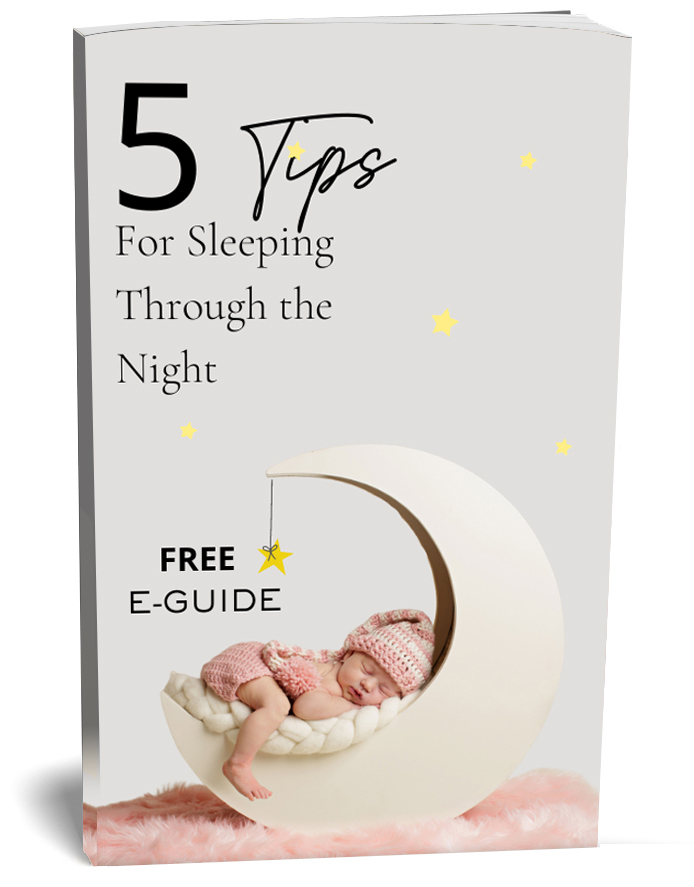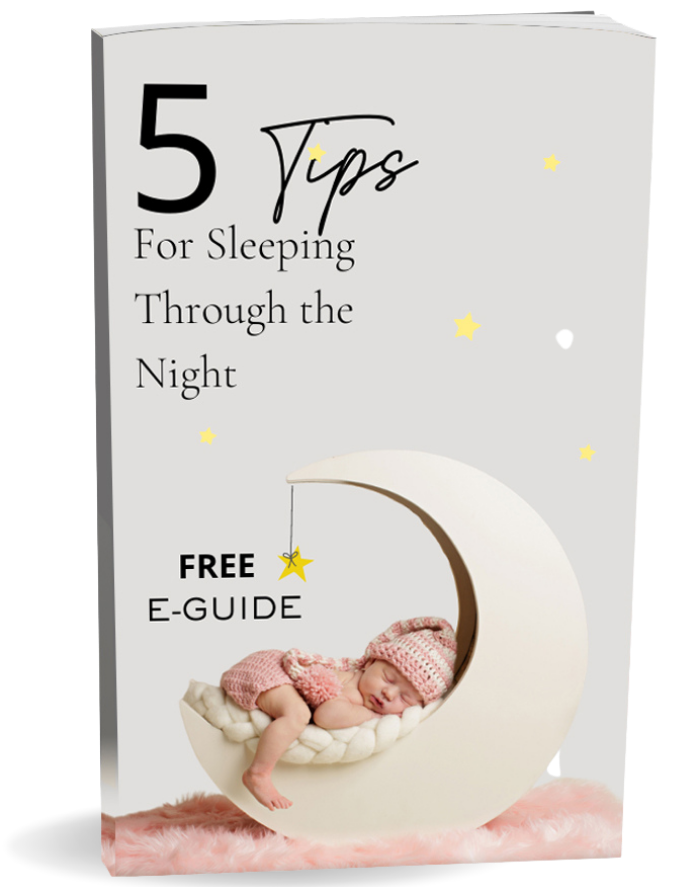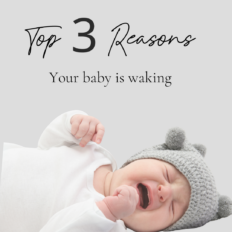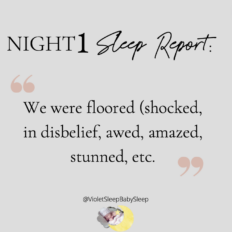Baby Rolls Over in Sleep: Is It Ever Safe?
Put your worries to bed with the latest information from the NIH and AAP below.
When my daughter was a newborn, checking her to make sure she was sleeping on her back pretty much became my part-time job. (I’m not kidding. I must have checked on her four or five times a night!)
I remember tiptoeing in to look because I was scared of my baby rolling over in her sleep. I had heard what you’ve probably read, too: that back-sleeping is safest for babies.
For a while, everything was fine. Then, just before she turned three months, old –– my baby started rolling herself over in sleep!
Even Worse, She Woke Up Crying
Brianna was used to being on her back and those first few times on her tummy frightened her.
Since becoming a Baby Sleep Expert and committing to ongoing training updates, I have learned that this is not uncommon.
When a baby wakes up with an entirely different visual perspective than before, it’s as if she fell asleep in one place, and suddenly – wham! – she’s in another. That’s how she sees it, and yes. It’s scary for her, at least at first.
What should you do if Baby rolls over in her sleep and is scared? How about if she’s rolling over during the day and she does it in her crib later, but seems fine? Is stomach-sleeping ever safe for your baby under 1 year old?
Here’s what the experts say.
Baby Sleep Tips – from an Expert? Yes, Really!
Click HERE, Mama!
If Your Baby Rolls Over During Sleep
The reality is: while I went a little over the top, there is a risk to babies rolling over onto their stomach at night, or to putting a baby down to sleep on their stomach.
At its most dangerous, there is an increased risk of SIDS (sudden infant death syndrome) in infants that sleep on their stomach.
However, it is important to note that this risk is highest before Baby is able to roll onto her stomach by herself.
What the AAP and SIDS Campaign Say
How dangerous is it if your baby rolls onto her stomach while sleeping but can’t roll back? Is it safe for a 4-month-old rolling over in sleep?
Is there a specific time when you no longer need to worry?
I asked those questions too. What I found out is:
- Put Baby on his back to sleep at naptimes and bedtimes. It’s still your safest bet.
- Baby should sleep on his own (without siblings or a parent) if possible, on a flat, firm, comfortable infant mattress.
- Keep your baby’s bassinet or crib in your room if possible, for Baby’s first 6 months.
- If you find that your baby has rolled over onto his stomach by himself, he has probably achieved a milestone where it is safe to do so, but keep an ear out for your little one to make sure he is not congested or is having difficulty rolling back over again.
Baby Won’t Sleep?
Rest Assured – I Can Help! Click Here
What is SIDS and What is SUIDS?
Experts have known for decades that the risk of sudden infant death syndrome (SIDS) increases when babies – especially until they are at a skill level where they can reliably rolling over on their own – are put to sleep on their tummy.
According to the Safe to Sleep campaign (formerly called Back to Sleep), SIDS falls under the broader category of SUIDS (sudden unexplained infant death syndrome). SUIDS includes all unexpected infant deaths, including from a known cause.
SIDS is the sudden death of a child under the age of 1 year without a known cause.
What’s the SIDS Risk if Baby Rolls on Her Tummy?
While this terrible tragedy can not always be explained, the NIH’s Safe to Sleep program says that back sleeping carries the LOWEST risk for infants.
They advise that you put Baby on her back and not on her stomach for all sleep times. This includes nap times.
The SIDS risk lowers as your baby gets older AND stronger (i.e. can roll over by herself, assuming she has no health issues.
It also lowers if you keep toys and other plush items out of Baby’s crib, if you put her down on a firm, supportive mattress made specifically for infants, if you breastfeed (this is not possible for all mothers), if you keep the room on the cooler rather than hot side, and, interestingly enough, if you allow your baby a pacifier.
If Your Baby Rolls Back Over
You may already be putting your baby to sleep on his back. But what if he keeps rolling over and waking up?
Many parents are scared of Baby rolling over in his sleep. And that makes sense, since the average baby will start to roll over somewhere between three and five months. He may even wake up crying because he has rolled over.
Try these methods:
- Start baby immediately with sleeping on his back. From birth onward, you should put him on his back to sleep unless his pediatrician has told you otherwise. With the habit instilled, he will feel more comfortable sleeping on his back.
- If your baby usually sleeps well, but begins crying suddenly in the night, go in to check. He may have rolled over onto his tummy and a simple check may make you feel better.
- If your baby cries because she has rolled on her tummy while sleeping and she’s safe, let her work it out.
- Try white noise when putting baby to sleep on her back if she has trouble settling down.
- If you were not aware of infant back sleep safety, it needs to become your baby’s new habit. Be aware that it may take a little time for your baby to get used to back sleeping if this is the case. DO NOT revert to stomach or side sleeping if she’s waking up due to habit. Be consistent.
- Remember that if your baby is otherwise healthy, and can roll over by herself with NO help, she has probably achieved a stage where rolling over in her sleep is not an additional risk to her. Ask your pediatrician for more advice on this subject.
If Your Baby Has a Special Issue
If your baby wears special health equipment or has another health issue, always follow the doctor’s advice on how to position her for sleep.
Most doctors will recommend back sleeping anyway, and a lot of infant medical equipment is made so Baby can lie on her back comfortably. If your baby wears special equipment or has a specific health condition and she seems uncomfortable sleeping on her back, ask the pediatrician.
The Bottom Line: Safe Sleep
If your baby rolls over in sleep and you can not seem to break her of the habit, or if she won’t let you roll her back, ask her pediatrician. She may be getting sick, or there may be some issue you aren’t aware of.
And if she’s rolling over and falling back to sleep contentedly, she has probably achieved an important milestone in lowering her risk of SIDS.
Safety always comes first. Once you know your baby can roll back over in sleep, you’ll both rest easier.


